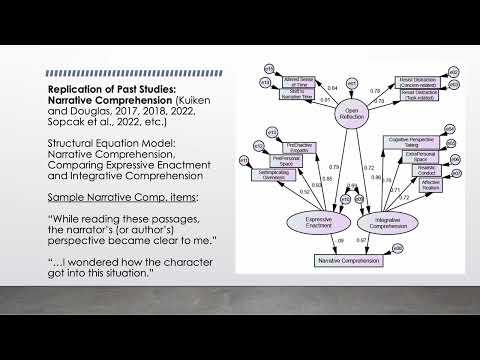 Speaker: Paul Sopcak @Paul
Speaker: Paul Sopcak @Paul
 Affiliation: RWTH Aachen University
Affiliation: RWTH Aachen University
 Co-authors: Cristina Ruiz Serrano, Karen Buro, & Don Kuiken
Co-authors: Cristina Ruiz Serrano, Karen Buro, & Don Kuiken
Title: The Effects of Reading Testimonials on Readers’ Perception of Sexual Violence
Abstract (long version below): The proposed paper reports on a study investigating the potential impact of different forms of reading engagement on attitudes towards sexual violence. Based on earlier studies, we anticipate that rape myth acceptance is decreased by a form of reading engagement that is passively explanatory and interpretative, whereas a more global form of moral understanding is facilitated by an actively expressive and explicative form of reading engagement. We further anticipate that this effect is text-independent, that is, it will be observed in responses to a text that explicitly thematizes sexual violence as well as for a text that does not.

 Long abstract
Long abstract
That reading literature can promote empathy and related prosocial attitudes is not a new claim.
Recently, however, empirical evidence supporting this claim has been growing, although the correlations and effect sizes are rather small (Dodell-Feder & Tamir 2018; Mumper & Gerrig 2017). Some scholars have begun to examine how individual differences affect the relation between literary reading and social cognition. The tendency to become absorbed—or transported into—the world of a narrative text has been given particular attention. For instance, Johnson (2013) found that transportation into a narrative correlated positively with the reduction of prejudice against Muslims. Bal and Veltkamp (2013) similarly found that high levels of transportation into a fictional narrative were associated with higher levels of affective empathy.
In the study we report on in the proposed paper, we adopt Kuiken & Douglas’s (2017) contrast between two forms of absorbed reading engagement, as measured by the Absorption-Like States Questionnaire (ASQ): Expressive Enactment (ASQ-EE) and Integrative Comprehension (ASQ-IC). Each of these forms of absorption involves different forms of empathy, and Kuiken and colleagues have repeatedly found that Expressive Enactment and Integrative Comprehension—and the contrasting forms of empathy that they subsume—differentially predict aesthetic, explanatory, and pragmatic reading outcomes. Most recently, Sopcak, Kuiken, and Douglas (2022) found that Expressive Enactment during reading mediates a distinctively experiential aesthetic process that 1) accentuates the reader’s own local moral prejudices and 2) supports a more global form of moral judgement called non-utilitarian respect. The results also replicate our earlier results indicating that the narrative explanatory form of reading engagement mediated by integrative comprehension in turn mediates a reduction in local moral prejudice.
The present study extends this paradigm to attitudes related to sexual violence, in particular to rape myths. Participants in the experimental condition read and respond to selected passages from Carmen Aguirre’s (2017) Mexican Hooker #1. Participants in the comparison condition read selected passages of roughly equal length from Carmen Aguirre’s (2011) Something Fierce.
References
Bal, P. Matthijs, and Martijn Veltkamp. 2013. “How Does Fiction Reading Influence Empathy? An Experimental Investigation on the Role of Emotional Transportation.” Edited by Liane Young. PLoS ONE 8 (1): e55341. How Does Fiction Reading Influence Empathy? An Experimental Investigation on the Role of Emotional Transportation.
Dodell-Feder, David, and Diana I. Tamir. 2018. “Fiction Reading Has a Small Positive Impact on Social Cognition: A Meta-Analysis.” Journal of Experimental Psychology: General 147 (11): 1713–27. APA PsycNet.
Johnson, Dan R. 2013. “Transportation into Literary Fiction Reduces Prejudice against and Increases Empathy for Arab-Muslims.” Scientific Study of Literature 3 (1): 77–92. Transportation into literary fiction reduces prejudice against and increases empathy for Arab-Muslims | John Benjamins.
Kuiken, Don, and Shawn Douglas. 2017. “Forms of Absorption that Facilitate the Aesthetic and Explanatory Effects of Literary Reading. In Narrative Absorption, edited by Frank Hakemulder, Moniek M. Kuijpers, Ed S. Tan, Katalin Bálint, and Miruna M. Doicaru, 27: 219–252. Amsterdam, Netherlands: John Benjamins.
Mumper, Micah L., and Richard J. Gerrig. 2017. “Leisure Reading and Social Cognition: A Meta-Analysis.” Psychology of Aesthetics, Creativity, and the Arts 11 (1): 109–20. APA PsycNet.
Sopcak, Paul, Don Kuiken, and Shawn Douglas. 2022. “Existential Reflection and Morality.” Frontiers in Communication 7, 991774. doi: 10.3389/fcomm.2022.991774

